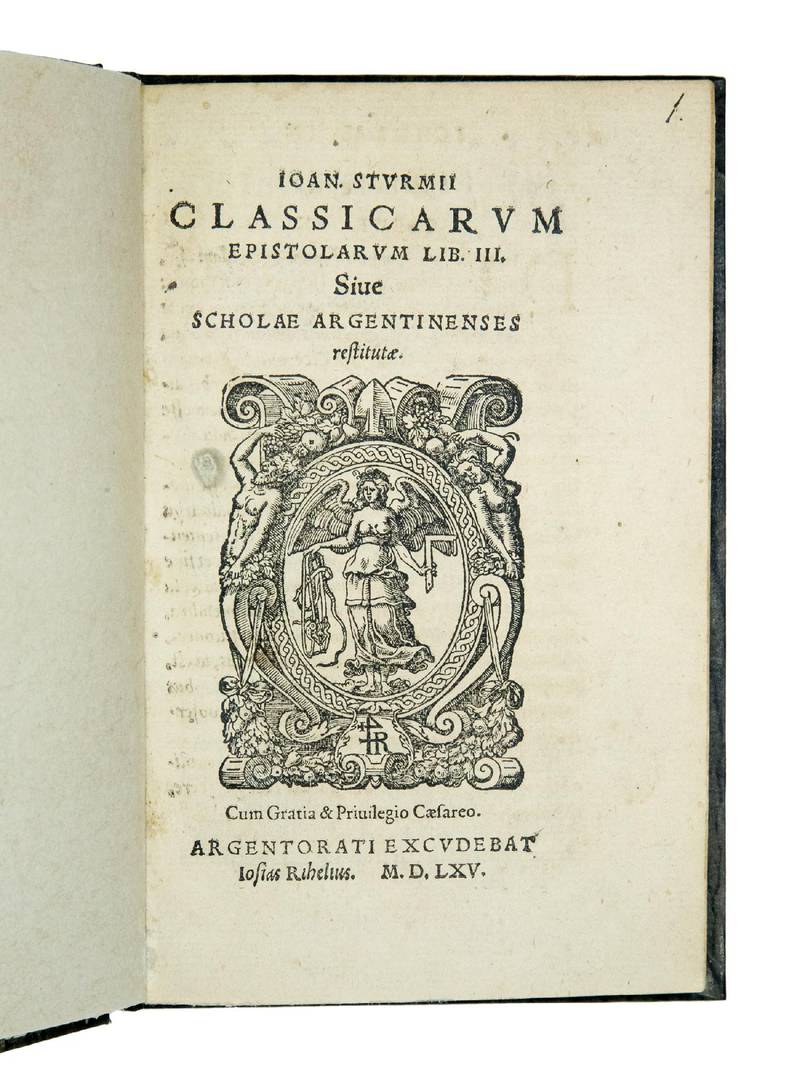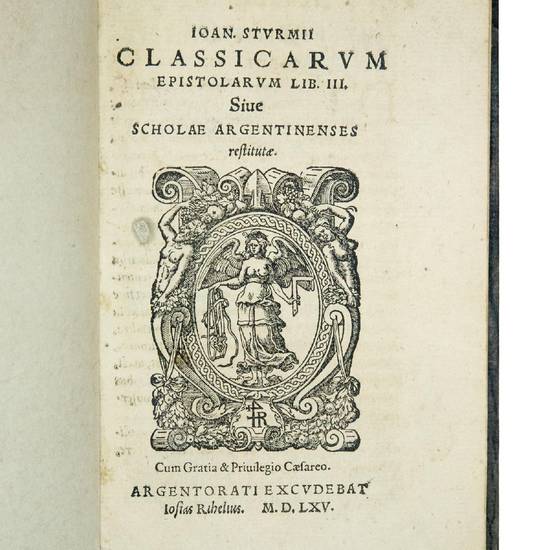8vo. (10), 69 leaves. A-K8 (-K8, a blank). With the printer's device on the title-page. Modern boards.
Ritter, no. 2213; VD 16, D-9915; J. Rott, Bibliographie des oeuvres imprimées du recteur strasbourgeois Jean Sturm (1507-1589), (Paris, 1975), no. 87a; Ch. Schmidt, La vie et les oeuvres de Jean Sturm, (Strasbourg, 1855), pp. 141-150.
ENLARGED SECOND EDITION (the first edition was printed in March 1565 with a different arrangement of the preliminary leaves, and the omission and addition of some letters). At the end of the volume are printed the duties of the dean and professors, the rules of the Strasbourg Gymnasium of 1538 (date of its foundation), and the curriculum of the Strasbourg and Lauingen schools.
Sturm's letters are not only a landmark in the development of public education in the sixteenth century, but also form one of the most influential treatises on the organization of humanistic schools (cf. B.S. Tinsley, Johann Sturm's Method for Humanistic Pedagogy, in: “Sixteenth Century Journal”, 20/1, 1989, pp. 23-40; and W. Melczer, La pensée éducative de Jean Sturm dans les ‘Classicae epistolae', in: “La Réforme et l'Education”, J. Boisset, ed., Toulouse, 1974, pp. 125-141).
(Dedication letter to:) Albert Duke of Prussia. Strassburg, March 30, 1565, (l. A2r)
(Prefatory letter to:) Mühlheim, Heinrich; Miege, Karl & Gottesheim, Friedrich. (l. A6v)
Feiss, Abraham. Strassburg, February 26, n.y. (l. 1r)
Schirner, Heinrich. Strassburg, February 26, n.y. (l. 3r)
Hübner, Matthias. Strassburg, March, n.d., n.y. (l. 6r)
Lingelser, Theobald. Strassburg, March, n.d., n.y. (l. 10r)
Hämmerlin, Martin. Strassburg (l. 13v)
Bitner, Jonas. Strassburg, March, n.d., n.y. (l. 15v)
Engler, Lorenz. Strassburg, March, n.d., n.y. (l. 18v)
Boschius, Michael. Strassburg, March, n.d., n.y. (l. 20v)
Reinhard, Johann. Strassburg, March, n.d., n.y. (l. 23v)
Golius, Theophil. Strassburg, March, n.d., n.y. (l. 26v)
Marbach, Johann. Strassburg, March, n.d., n.y. (l. 29r)
Tuppius, Lorenz. Strassburg, March, n.d., n.y. (l. 31v)
Beuther, Michael. Strassburg, March, n.d., n.y. (l. 34r)
I.S. Physicus. Strassburg, March, n.d., n.y. (l. 36r)
Dasypodius, Conrad. Strassburg, March, n.d., n.y. (l. 37r)
Hertel, Leonhard. Strassburg, March, n.d., n.y. (l. 40r)
Erythraeus, Valentin. Strassburg, March, n.d., n.y. (l. 44r)
Viluelsemius. Strassburg, March, n.d., n.y. (l. 46r)
Kyber, Elias. Strassburg, March, n.d., n.y. (l. 47r)
Stiefelreuter, Matthias. Strassburg (l. 49r)
Ostermann, Simon. Strassburg, March 29, n.y. (l. 50v)
id. Strassburg, June, 1565 (l. 52v)
Johann Sturm was born at Schleidan in the Rhineland (near Aachen) and had his early education in Liège at Saint Jerome's, a school conducted by the Brethren of the Common Life. At the University of Louvain, he and his professor of Greek, Rutger Regius, prepared and published Greek texts for students, thus establishing a pattern for Sturm's life.
In 1529 he went to Paris to study medicine, rhetoric and dialectic. His patrons included Guillaume Budé, Marguerite de Navarre, and Cardinal Jean Du Bellay. By 1534 he was lecturing at the new Collège de France. His commentaries on Cicero and on logic earned for him fame as a humanist scholar and an outstanding teacher. Drawn into Cardinal du Bellay's effort to ally Francis I with the German Protestants, Sturm's position became precarious. In December 1536 he fled France for Strasbourg, where he was hired to teach rhetoric and dialectic in a newly founded school. Two years later the Latin schools and lower theological classes were combined into one institution, the Strasbourg Gymnasium. Sturm was appointed rector.
The goal of the gymnasiums was to create a Christian citizen and also to train young patricians for their future role as magistrates and civil servants. Sturm believed the curriculum must also provide the knowledge of the nature and of the mind so fully cultivated by the ancients. For over forty years Sturm directed the Strasbourg Gymnasium, but as a Calvinist lost his position during the religious struggles in 1582 (cf. B. Schröder, ed., Johannes Sturm (1507–1589), Pädagoge der Reformation, Jena, 2009, passim).
[9099]





